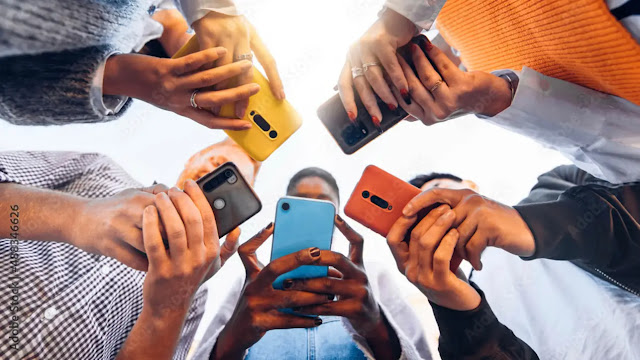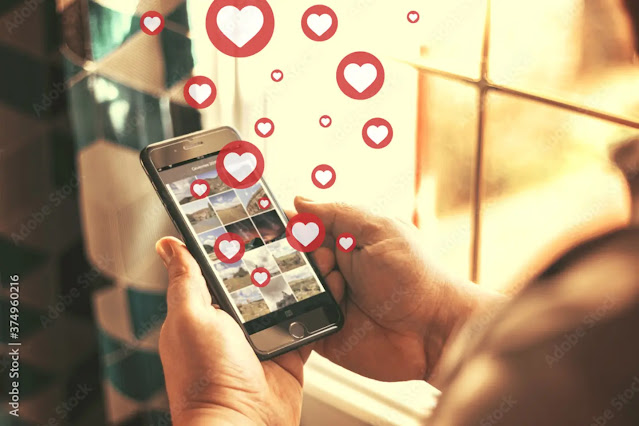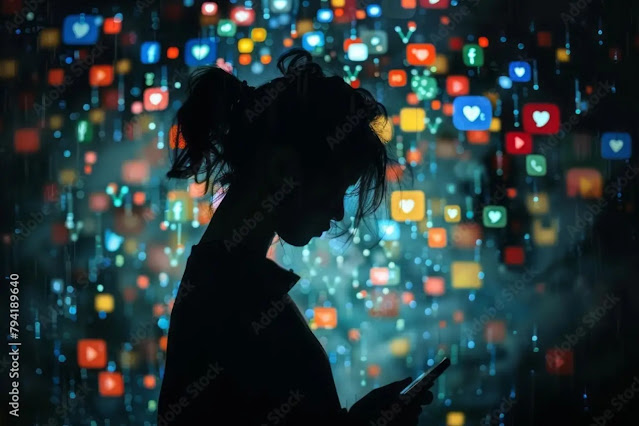Explore the effects of social media on young people's mental health. Learn about the positive and negative impacts, signs of addiction, and how to foster a healthier online balance.
 |
| Thoughtful young persons using their phones on social Media (Adobestock Photo) |
"Social media is not the problem. It's the imbalance between online and offline life that steals our peace." — Unknown
The Impact of Social Media on Youth Mental Health
In today’s digital age, social media has become more than just a means of communication; it’s where our youth are shaping their identities, seeking validation, and finding their communities. I’ve seen firsthand how many young people, perhaps like those we all know, seem to lose themselves in these online spaces, sometimes for hours on end. While social media can offer connection and support, there’s a dark side that’s slowly surfacing.
The challenge for many parents isn’t that they don’t care, it’s that they may not fully understand how these digital worlds affect their children's emotional well-being. We see the joy they find in connecting with friends, but we sometimes miss the quiet moments of self-doubt, comparison, and anxiety that can follow a single scroll.
Positive Effects of Social Media
It’s easy to point fingers at social media, but let’s start with its benefits. For many young people, these platforms provide a sense of belonging. They offer spaces to express themselves creatively, join support groups, and even access mental health resources. We mustn’t forget that, for some, social media is their lifeline to positivity.
 |
| Photo showing a heart with icons of social media (Adobestock Photo) |
The Dark Side: Social Media and Mental Health Struggles
However, with every tool, there’s a flip side. Social media can become a breeding ground for insecurities. Constant exposure to curated, often unattainable lives can make teens feel like they don’t measure up. The quiet anxiety, the subtle drop in self-esteem—it’s happening right in front of us, but so often we don’t see it.
Many teens I’ve spoken to admit they feel trapped by the pressure to maintain appearances online. The likes and comments they chase can feel like fleeting validations, leaving them empty when the notifications slow down. The comparison game on platforms like Instagram or TikTok can foster feelings of inadequacy.
The Role of Algorithms: Fueling the Fire
Have you ever noticed how social media seems to ‘know’ what your teen is feeling? That’s because platforms are built to keep users engaged, pushing content that aligns with what they’ve interacted with. The downside is that if a young person is struggling with body image or feeling anxious, they might be fed more content that reinforces these insecurities.
Social media algorithms can unintentionally amplify negative feelings, pulling youth deeper into a cycle of comparison and dissatisfaction. It's easy to see how this can contribute to a spiral of declining mental health.
Signs of Social Media Addiction

Frustrated teen staring at their phone, with multiple notifications (Adobestock Photo)

For some teens, the line between normal use and addiction blurs. It’s important to recognize the signs:
- Spending hours scrolling, losing track of time.
- Using social media as an escape from real-life problems.
- Anxiety when not online or checking notifications.
- Constant comparison to peers online.
How Parents Can Help: Finding a Balance

Comforting parent and child in a casual conversation (Adobestock Photo)

It’s tough to know where to start as a parent. The instinct might be to take away the phone, but that’s not always the answer. Instead, open conversations about social media’s impact can go a long way. Encourage offline activities that build self-esteem, and ensure there’s space for balance.
Remind your kids that what they see online isn’t always reality—it’s a highlight reel. And that their worth is far more than the number of likes they receive.
Final Thoughts: The Call for Greater Understanding

Social Media Icons (Adobestock Photo)

Social media is a tool, not the enemy. But without balance, it can take more than it gives. Our youth need guidance, and more importantly, they need our understanding. I’ve seen too many young people struggling, silently battling feelings of loneliness and insecurity, while we, the adults in their lives, are too busy to notice. Let’s not wait until it’s too late.
As parents, guardians, and friends, we must be vigilant. It’s time to step in—not with judgment, but with love and guidance. Their world is constantly changing, and the emotional rollercoaster of growing up is now shared online for all to see. More care, more attention, more conversations are needed now than ever before.
Let’s help our children find the balance they need in an overwhelming digital world. Because at the end of the day, their mental health matters more than any post, like, or follower count.
Comments
Post a Comment
Thank you for your comment and please check our other blogs. We wait for you.